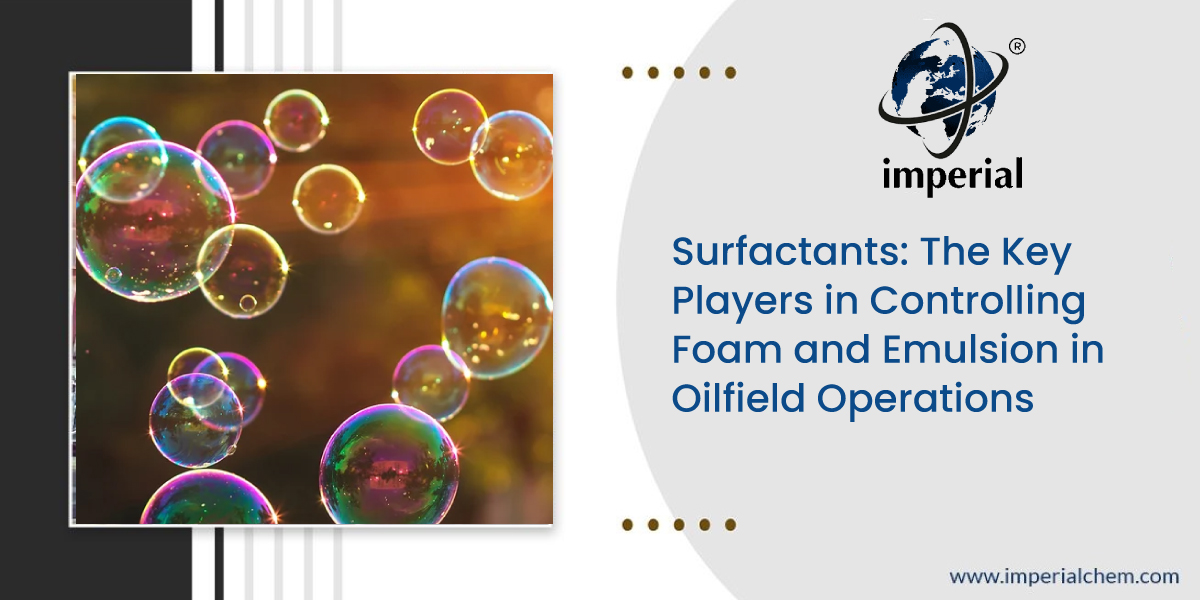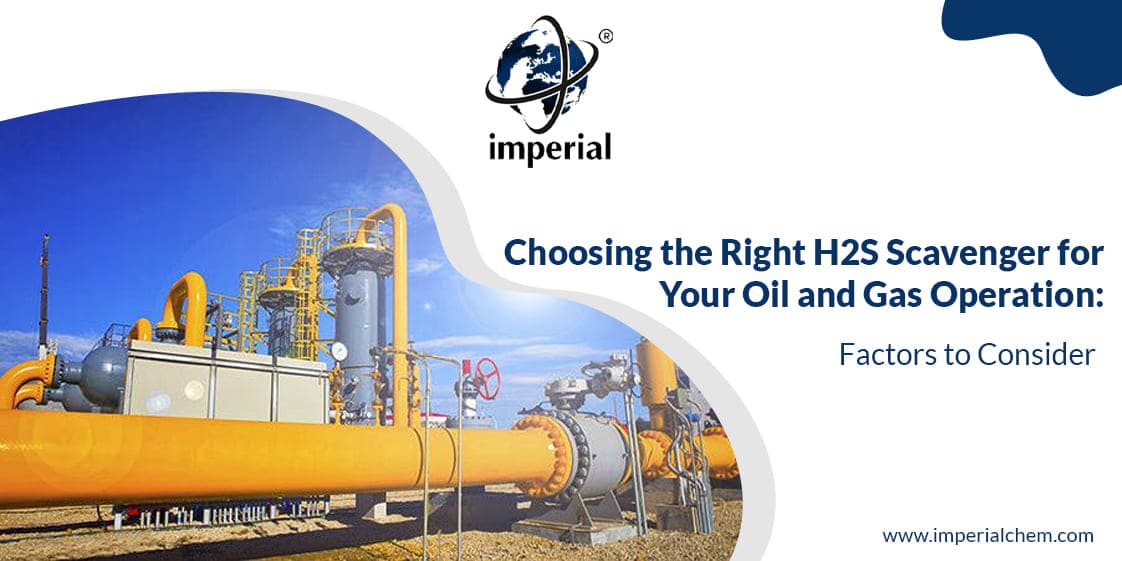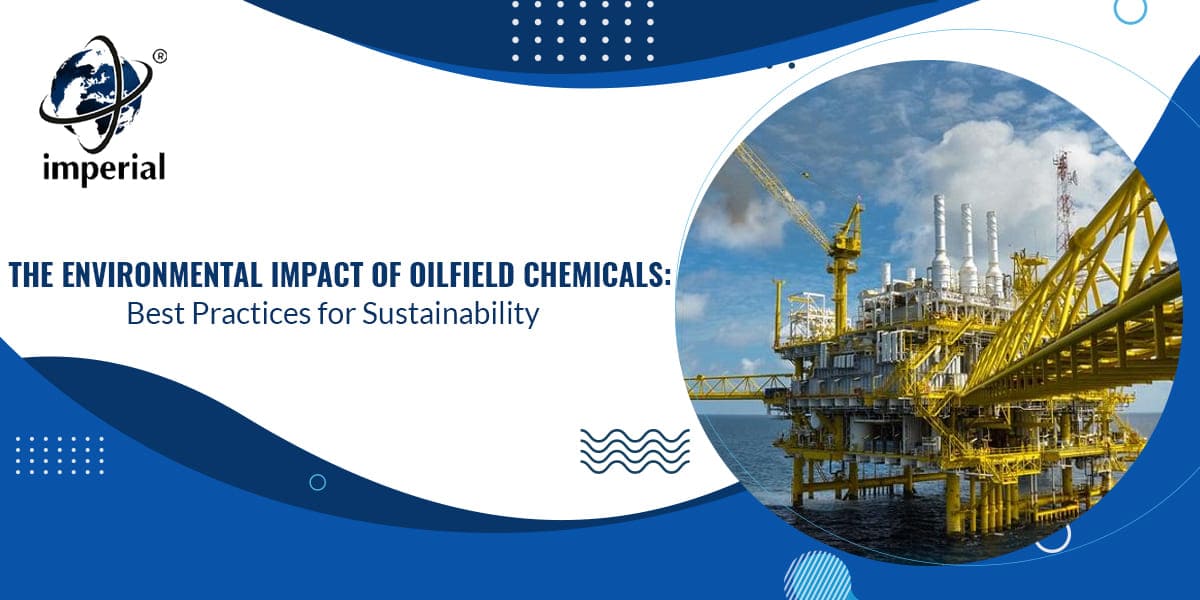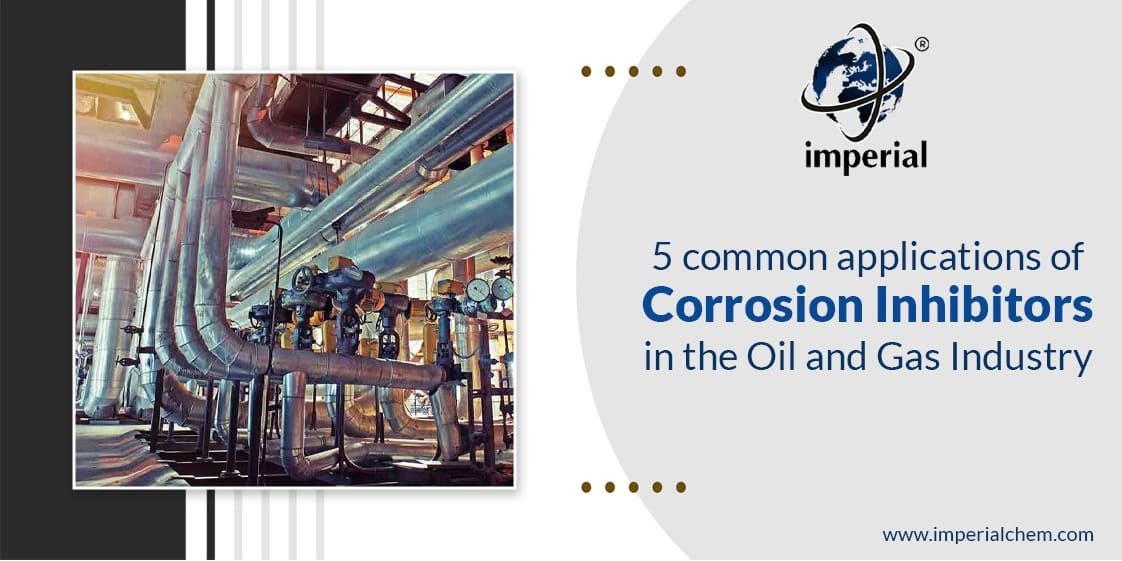- All Products
- Corrosion Inhibitor
- Oxygen Scavenger
- Drag Reducing Agent / Flow Improver
- H2S Scavenger
- Triazine
- Demulsifier
- Emulsion Breaker
- Surfactant
- Wax / Parrafin Disperssant
- Asphaltene Inhibitor

Blog Details

18
Jul
Surfactants: The Key Players in Controlling Foam and Emulsion in Oilfield Operations
In order to effectively mix diverse substances, it is necessary to use chemical molecules known as surfactants, or surface-active agents, which reduce surface tension. Imperial Oilfield Chemicals is an excellent Surfactant manufacturer in India, serving a wide range of sectors. The oil and gas industry, the pharmaceutical industry, the agricultural industry, and the personal care industry all benefit greatly from these multipurpose chemicals. When it comes to producing surfactants, Imperial Oilfield Chemicals is head and shoulders above the competition. In addition, they are a dependable exporter of surfactants in Morocco, offering a broad selection of surfactants to meet the expanding needs of the local market. Imperial Oilfield Chemicals is still recognised as a leader in the global surfactant market due to our extensive experience in the industry.
Types of Surfactants:
Surfactants are an essential part of oilfield operations, both for improving oil recovery and streamlining other procedures. Different chemical compositions and uses result in distinct categories for these surfactants. The oil and gas industry often uses the following surfactants:
● Anionic Surfactants: Negatively charged anionic surfactants find widespread use in the oil industry. Oil is more easily displaced from reservoir rocks because of their ability to lower the interfacial tension between oil and water. Surfactant flooding and water flooding are two methods that use anionic surfactants to improve oil recovery.
● Cationic Surfactants: Cationic surfactants are typically utilised as corrosion inhibitors in the oilfield due to their positive charge. They form a protective layer that keeps metal surfaces like pipes and machinery from rusting. Cationic surfactants are used as biocides and demulsifiers in the oil industry.
● Nonionic Surfactants: Nonionic surfactants are non-ionic, meaning they don't have any ionic groups and are hence uncharged. Because of their resilience to hard water and compatibility with a wide range of chemicals, they find widespread application in oilfield operations. Nonionic surfactants are useful for increasing the solubility of hydrophobic substances, stabilising foam, and emulsifying oil and water.
● Amphiphilic Surfactants: Hydrophobic (oil-loving) and water-loving (water-loving) characteristics are present in amphiphilic surfactants. They play a crucial role in combining oil and water into a consistent emulsion. Wetting agents on reservoir rock surfaces, drilling fluids, and oil-water separation are all potential uses for amphiphilic surfactants.
● Biosurfactants: Microorganisms produce biosurfactants, which are surface-active chemicals. Their eco-friendliness and the possibility of higher oil recovery are attracting the attention of the oil and gas industry. Biosurfactants have been shown to enhance oil mobilisation from reservoir rocks by decreasing interfacial tension and changing wettability.
● Synergistic Surfactant Blends: Synergistic surfactant blends are frequently used to improve the efficiency of oilfield operations and to solve certain problems that arise. Synergistic effects can be achieved by combining several types of surfactants, leading to enhanced oil recovery, emulsion stability, and productivity.
Note that reservoir features, fluid composition, and intended results all play a role in surfactant selection for a given oilfield operation. Surfactant supplier in Morocco with experience, such as Imperial Oilfield Chemicals, offer specialised services and knowledge to cater to the oil and gas industry's unique requirements.
The Role of Surfactants in Oilfield Operations?
Effectiveness, oil recovery, and production process optimisation are just a few of the many oilfield operations that benefit greatly from the use of surfactants. Imperial Oilfield Chemicals, a pioneering Surfactant manufacturer in India, is aware of the compounds' significance in the petroleum and natural gas industries.
Because of its ability to lower the interfacial tension between oil, water, and solid surfaces, surfactants are useful in the oil industry. Oil displacement from reservoir rocks is improved as a result. Surfactants allow water-based fluids to better penetrate and sweep across the reservoir, mobilising stored oil, by reducing interfacial tension.
As a reliable Surfactant exporter in Morocco, Imperial Oilfield Chemicals meets the demands of the country's oilfield industry. Their selection of surfactants allows for superior oil-water separation, corrosion prevention, and emulsion stabilisation.
Drilling fluids also use surfactants to help reduce friction, keep pipes from sticking, and stabilise the wellbore. As wetting agents, they improve drilling performance and wellbore control by increasing fluid contact with reservoir rocks.
Because of Imperial Oilfield Chemicals' extensive background as a surfactant maker, the company is able to create bespoke formulas to meet the needs of the oil industry.
Advantages of using Surfactants in Oilfield Operations:
Surfactants are used in oilfield operations because of the many benefits they provide to the oil and gas sector. Imperial Oilfield Chemicals, a leading Indian surfactant producer, is aware of these advantages and produces high-quality surfactants to fulfil the demands of the industry worldwide, including as a Surfactant exporter in Morocco.
Surfactants' capacity to lessen the adhesion forces between oil, water, and solids is a significant benefit. Because of its quality, oil can be more easily displaced from reservoir rocks, resulting in increased oil recovery. Improved reservoir penetration and sweep with the use of surfactants leads to more oil being extracted from the ground.
Surfactants also stabilise emulsions, making it easier to filter out oil and water. In oil-water separation and demulsification, where surfactants aid in achieving clean and separated phases, this is of particular use.
When used as wetting agents, surfactants improve the connection between drilling fluids and reservoir rocks. As a result of this quality, drilling efficiency is increased, problems such as pipe sticking are lessened, and wellbore stability is strengthened.
As a surfactant producer, exporter, and supplier, Imperial Oilfield Chemicals offers the benefit of custom formulas. In the oil industry, every operation has its own unique set of needs, and they provide surfactants that can be tailored to those specifications for maximum efficiency and the best possible results.
The Key Players in Controlling Foam and Emulsion in Oilfield Operations:
As a top Surfactant manufacturer in India and a trusted surfactant exporter and supplier in Morocco, Imperial Oilfield Chemicals provides effective solutions for the management of foam and emulsion in oilfield operations.
● Foam Control: Foam can be managed with the help of surfactants, which decrease surface tension and render foam bubbles unstable. The addition of surfactants to a foam-forming system causes a thin layer to form at the air-liquid interfaces, which compromises the bubble structure. The surface tension is reduced in this way, leading to the burst of the bubbles. Effective foam suppression and enhanced fluid flow can be ensured in oilfield operations with the use of surfactants from Imperial Oilfield Chemicals.
● Emulsion Control: Surfactants regulate emulsion by modifying oil and water's interfacial characteristics. The interfacial tension between the oil and water can be lowered by their adsorption, and stable emulsion droplets won't be able to form. Surfactants encourage the coalescence and separation of the oil and water phases by destabilising the emulsion. To better facilitate efficient demulsification and oil-water separation in oilfield processes, Imperial Oilfield Chemicals offers surfactants specifically developed for emulsion management.
As a seasoned surfactant producer, Imperial Oilfield Chemicals is aware of the significance of surfactant selection for efficient foam and emulsion control. They take great effort in developing their surfactant formulations to ensure they have the desired surface-active characteristics and are compatible with a wide range of oilfield fluids and operating environments.
Improved production efficiency, decreased equipment downtime, and higher overall operational performance can be achieved with the use of innovative surfactants from Imperial Oilfield Chemicals to manage foam and emulsion. Imperial Oilfield Chemicals, an international surfactant exporter and provider, keeps these premium products on hand to meet the demands of the Moroccan oil and gas industry.
Final Thoughts:
When it comes to managing foam and emulsion, surfactants emerge as the unsung heroes in the oilfield. Surface tension is decreased, foam bubbles are destabilised, and the interfacial properties of oil and water are changed thanks to their special features and functions. The oil and gas industry in Morocco has benefited from Imperial Oilfield Chemicals' specialised surfactant solutions because of the company's reputation as a leading Surfactant manufacturer in India
Imperial Oilfield Chemicals provides cutting-edge surfactants that help oilfield businesses cut down on foam, increase fluid flow, and better separate oil from water. Optimising manufacturing processes, reducing equipment downtime, and maximising operational performance are all made much easier with effective foam and emulsion control. Oilfield operators in India and Morocco can tackle foam and emulsion issues with confidence thanks to Imperial Oilfield Chemicals' dedication to delivering high-quality surfactants.
Surfactants continue to play a crucial role in the oil and gas industry since their ability to manage foam and emulsion is crucial to the success and efficiency of oilfield operations. In the oil and gas industry, Imperial Oilfield Chemicals' specialised surfactant capabilities and extensive knowledge play a crucial role in delivering solutions that boost productivity, safety, and quality of service.











